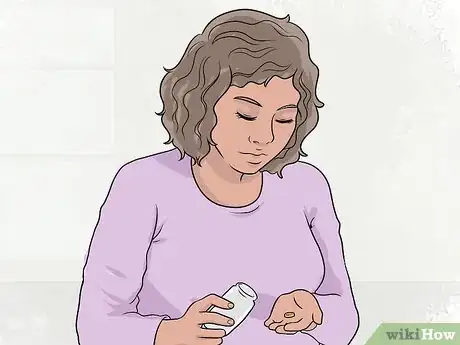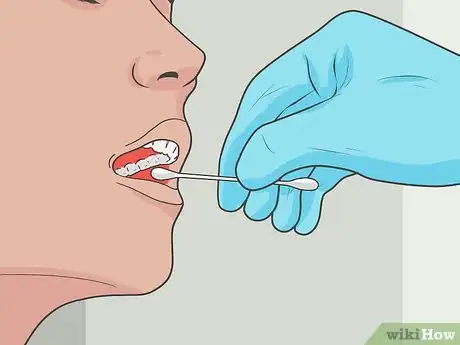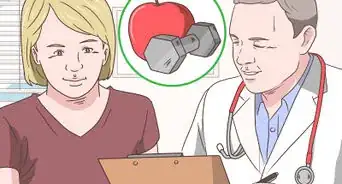This article was co-authored by wikiHow Staff. Our trained team of editors and researchers validate articles for accuracy and comprehensiveness. wikiHow's Content Management Team carefully monitors the work from our editorial staff to ensure that each article is backed by trusted research and meets our high quality standards.
There are 9 references cited in this article, which can be found at the bottom of the page.
This article has been viewed 21,294 times.
Learn more...
Amyotrophic lateral sclerosis (ALS) is a degenerative disease that attacks nerve cells in the brain and spinal cord, affecting muscle movement. There isn’t yet a cure for this disease, but there are steps you can take to reduce your risk of developing it. Make an effort to eat a healthy diet rich in carotenoids, lutein, beta-carotene, vitamin E, and Omega-3 fatty acids. Look into your genetic history to see if you are at risk for the disease, and be mindful of possible ALS symptoms that might appear. To help prevent ALS in the future, help to keep research going by donating to the ALS Foundation.
Steps
Improving Your Nutrition
-
1Eat fruits and vegetables that are bright red, orange, or yellow. Carotenoids have been linked to the prevention of onset ALS. These nutrients are also responsible for giving fruits and vegetables their red, orange, or yellow hue. Infuse your diet with as much of this produce as possible, including:[1]
- Peppers (in each of these colors)
- Apples
- Bananas
- Oranges
- Tomatoes
- Yellow zucchini
- Pumpkin
-
2Consume 3-4 servings of leafy green vegetables per week. Beta-carotene and lutein are both associated with a lowered risk for ALS. You can find both of these nutrients in dark green, leafy vegetables like spinach, kale, and romaine lettuce. Try to consume at least 3-4 servings of these foods a week by adding them to salads, sandwiches, wraps, or smoothies.[2]Advertisement
-
3Eat foods rich in Omega-3 fatty acids 3-4 times a week. Omega-3 fatty acids have a wealth of health benefits, including improved cardiovascular health and lowered blood pressure. They are also linked to a lowered risk of ALS when consumed regularly. Include 3-4 servings of omega-3 rich foods in your diet per week, such as:[3]
- Fatty fish like salmon and tuna
- Nuts (especially walnuts)
- Flax seeds
- Leafy vegetables
-
4Take vitamin E supplements. Research indicates that taking daily vitamin E supplements reduces the risk of ALS. Ask you doctor if these supplements are right for you. In some cases, vitamin E can increase your tendency to bleed, which may be too much of a risk for certain individuals.[4]
Diagnosing and Slowing the Disease
-
1Do genetic testing to see if you carry a gene for ALS. A good way of assessing your risk for ALS is genetic testing, as ALS is often hereditary. Ask your doctor about these tests, which require a cheek swab, blood sample, or saliva sample from you to be performed. Genetic testing can also be done without a doctor's approval through private companies, but the process can cost up to a thousand dollars and the results are generally less reliable and complete.[5]
-
2Look out for the basic signs of ALS. In general, the first symptoms of ALS to appear are difficulty breathing and swallowing, or frequent gagging or choking. Take note if you experience these symptoms several times a week, and if they grow in frequency or severity. Other initial signs of the disease could include weakness of the muscles and muscle cramping.[6]
-
3See your doctor at the first sign of possible symptoms. Once ALS is diagnosed, a doctor can start you on riluzole, a drug that slows down the disease and extends life expectancy. See your doctor at the first possible signs of ALS. Your doctor can run a variety of tests to assess whether or not you are suffering from the illness.[7]
-
4Avoid strength training once you are diagnosed to preserve your muscles. While strength training might seem like a good way to maintain muscle in the face of a degenerative disease, you should not do it if you are suffering from ALS. Muscle-building exercise actually involves the breakdown of muscle as part of the process, which can speed up the degeneration caused by ALS. Stick to moderate, cardiovascular exercise like walking or cycling and avoid intense workouts.[8]
Raising Money for ALS Research
-
1Donate money for ALS research. Though there is no cure for ALS, research is being conducted in the focus areas of nanotechnology, precision medicine, and drug development. Help to prevent ALS by giving money to the cause, either in a single payment or through recurring monthly donations. Visit the ALS Association’s website at https://www.als.org/donate to donate.
- Donations to the ALS Association are tax deductible.
- Donate online with your credit card or bank information, or mail in a donation.
-
2Take part in the ALS Association’s Walk to defeat ALS. Each year the ALS Association holds a fundraising walk in support of research and care services for the disease. Visit the ALS Association’s website at https://secure2.convio.net/alsa/site/SPageServer?pagename=WLK_landing to find a walk near you and register. Encourage family, friends, co-workers, and other acquaintances to sponsor you, in person or through social media.
-
3Hold your own fundraiser to benefit the ALS Association. Sign up on the ALS Association’s website to build your own fundraising page and host a charity event. Set a fundraising goal and organize an event to raise money. Your fundraiser could be anything from a bake sale to comedy night or cycling marathon, depending on the support and resources you have at your disposal.[9]
References
- ↑ https://www.als.org/sites/default/files/2020-04/Maintaining%20good%20nutrition%20with%20ALS.pdf
- ↑ https://www.sciencedaily.com/releases/2013/01/130129080508.htm
- ↑ https://www.hsph.harvard.edu/news/hsph-in-the-news/omega-3-fatty-acids-may-reduce-risk-of-lou-gehrigs-disease/
- ↑ https://www.ncbi.nlm.nih.gov/pmc/articles/PMC3105261/
- ↑ https://www.als.org/understanding-als/who-gets-als/genetic-testing
- ↑ https://www.ninds.nih.gov/amyotrophic-lateral-sclerosis-als-fact-sheet#symptoms
- ↑ https://my.clevelandclinic.org/health/diseases/16729-amyotrophic-lateral-sclerosis-als
- ↑ http://alsworldwide.org/care-and-support/article/exercise-helpful-or-harmful-in-als
- ↑ https://www.als.org/get-involved





-Step-11-Version-2.webp)


-Step-18.webp)






























































Medical Disclaimer
The content of this article is not intended to be a substitute for professional medical advice, examination, diagnosis, or treatment. You should always contact your doctor or other qualified healthcare professional before starting, changing, or stopping any kind of health treatment.
Read More...